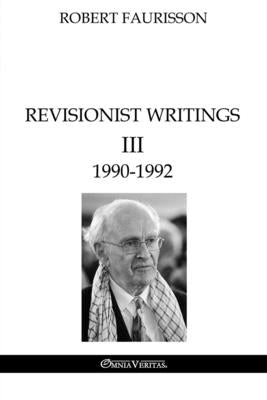Before you leave...
Take 20% off your first order
20% off
Enter the code below at checkout to get 20% off your first order
Discover summer reading lists for all ages & interests!
Find Your Next Read

The so-called 'Faurisson affair' began on 16 November 1978 with the publication of an article in Le Matin de Paris. I had known for several years that the day the press made my revisionist views public, I would face a storm. By its very nature, revisionism can only disturb public order; where certainties reign, the spirit of free examination is an intruder and causes a scandal. The first task of the courts is less to defend justice than to preserve public order. Truth, in the sense in which I understand the word (i.e. that which is verifiable), is of interest to judges only if it does not cause a profound disturbance of public order. I had no illusions that I would be taken to court and convicted, and that was on top of the physical assaults, the press campaigns and the upheaval in my personal, family and professional life.
My previous lecture took place in September 1983 and was entitled ' Revisionism on Trial: Developments in France, 1979-1983'. The present lecture is a sequel; I have entitled it 'My experience of revisionism (September 1983-September 1987)'. The period 1979-1983 in France was marked by judicial activity against revisionism. The period 1983-1987 was marked by a slowdown in this activity, which, I fear, will pick up again from 1987-1988. In France, the Jewish organisations that had initiated the legal proceedings were greatly disappointed and even disconcerted by the relative lightness of my conviction in April 1983. They expected better from French justice. They wanted my 'skin' and all they got was a pound of my flesh. They wanted the judges to declare: Faurisson is a falsifier of history; his work on the gas chambers is full of carelessness, negligence, deliberate ignorance and lies; Faurisson is malicious and dangerous. However, on 26 April 1983, the judges of the First Chamber of the Paris Court of Appeal concluded, as it were: Faurisson is a serious researcher; we find in his work on the gas chambers no slight, no negligence, no deliberate ignorance, no lies; but Faurisson is perhaps malicious and he is certainly dangerous; we condemn him for this probable malice and for this danger, but we do not condemn his work on the gas chambers, which is serious. On the contrary, given the seriousness of this work, we guarantee every Frenchman the right to say, if that is his opinion, that the gas chambers did not exist.
Thanks for subscribing!
This email has been registered!
Take 20% off your first order
Enter the code below at checkout to get 20% off your first order